How to grow herbs indoors for a truly delicious twist on the classic houseplant trend
Forget houseplants, here's how to start a thriving indoor herb garden like a professional


Houseplanteers may want to fill every corner of their homes with tropical-looking plants and orchids, but learning how to grow herbs indoors is the ultimate way to inject some greenery into your space and improve your culinary game.
Let's face facts: indoor plants are having something of a neverending moment – and the vegetable gardening trend isn't going away anytime soon, either. So why not combine the two by starting your own indoor herb garden?
Easy to grow and incredibly satisfying to harvest, herbs are a wonderful addition to any meal. If you're short on soil space, don't despair: these tasty little edimentals are one of the easiest plants to grow indoors.
If you follow our expert tips and advice on how to grow herbs indoors, you'll be well on your way to transforming your kitchen windowsill into a thriving herb garden. Bon Appetit.
How to grow herbs indoors
"It's official: searches for ‘how to create a herb garden’ and ‘DIY herb garden’ have gone up by 200% over the last three months," says Lucy Rhead, gardening enthusiast at Gtech.
"So, whether you want a steady supply of basil or would like to try your hand at growing mint, an indoor herb garden is a great gateway to becoming a fully-fledged green thumb."
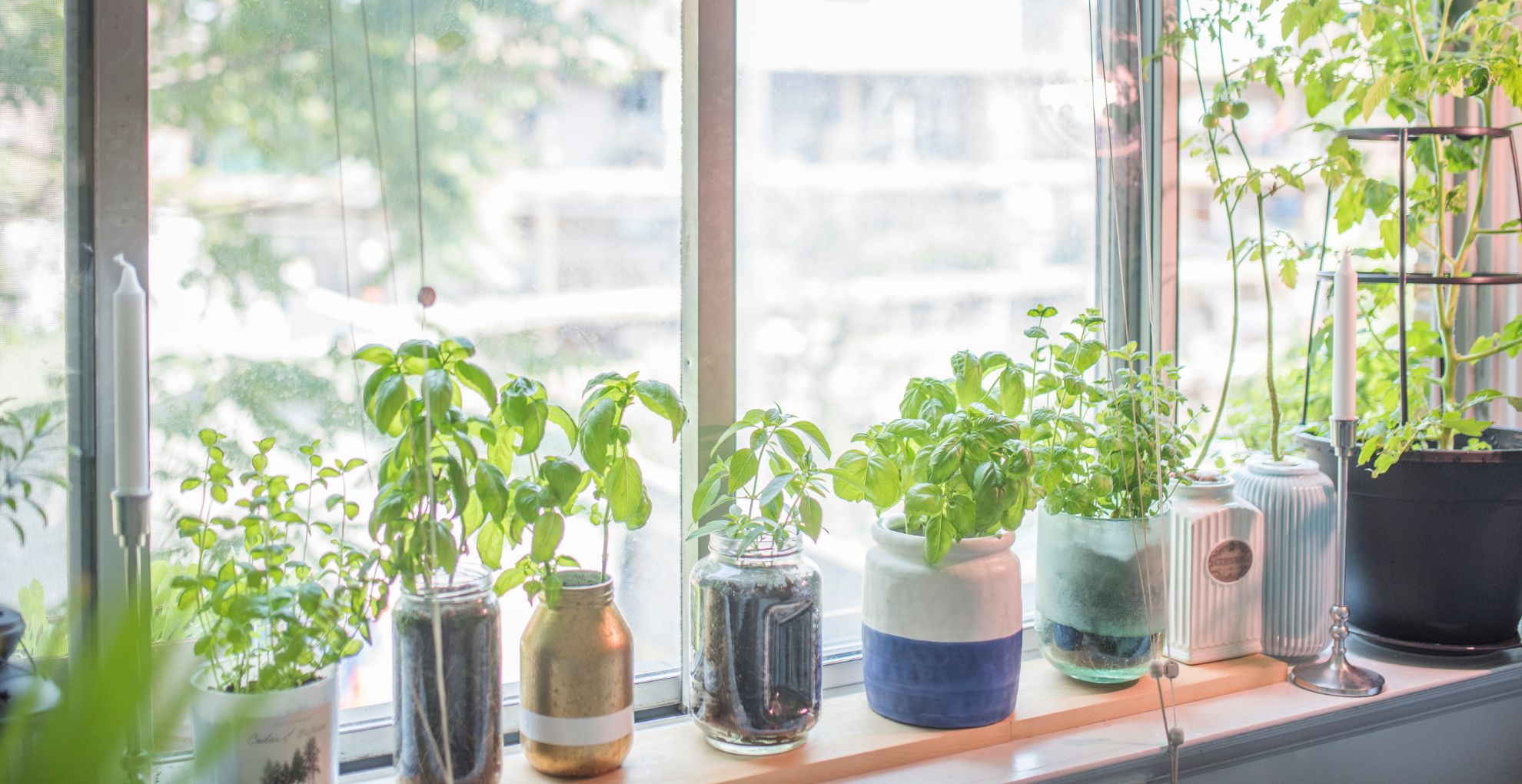
Keen to learn how to grow indoors like a pro? Thankfully, help is at hand in the form of Jekka McVicar, who, with over 40 years of experience in sustainably growing herbs and who curates the dedicated herb gardens at Riverstone, is better known to many as the undisputed 'Queen Of Herbs'.
Sign up to our free daily email for the latest royal and entertainment news, interesting opinion, expert advice on styling and beauty trends, and no-nonsense guides to the health and wellness questions you want answered.
"Having a collection of herbs in containers placed in a sunny spot can greatly benefit both the kitchen and your personal wellbeing," she says.
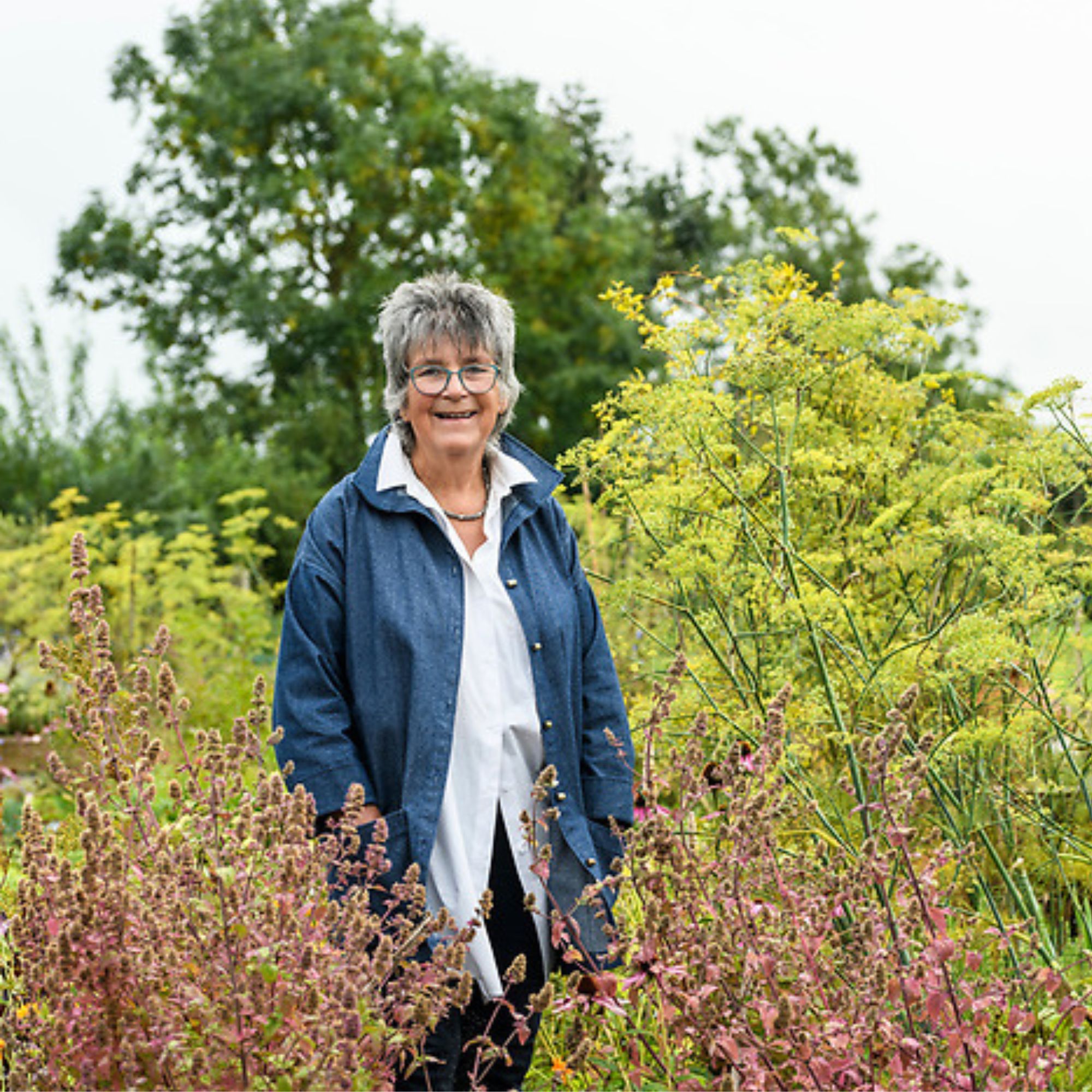
Jekka McVicar is an organic grower of herbs and a horticultural author, garden designer, herb consultant, horticultural judge and moderator. She was awarded the Victoria Medal of Honour (VMH) in Horticulture by the Royal Horticultural Society (RHS), has designed herb gardens at Riverstone – a leading developer of exceptional retirement living in prime London locations – and recently launched her new book, 100 Herbs to Grow available at Amazon.
"These homegrown herbs not only cost less than store-bought ones but also offer superior taste, longevity, and health benefits," adds Jekka, who notes that new research with UK retirees revealed that nurturing plants and herbs rank high among their stress-reducing activities and daily exercise routines.
With that in mind, then...
What you will need
You wouldn't begin mowing your lawn or chitting your potatoes without the right tools to hand, so be sure to prep accordingly before beginning How To Grow Herbs Indoors 101.
To that end, then, make sure you have:
- A selection of pots (terracotta is considered the best for these tasty little plants, as it's breathable and great at regulating temperatures)
- A saucer to go under the pot (nobody wants a wet windowsill)
- A few packets of seeds (basil, chives, mint, parsley, rosemary, and thyme are counted among the easiest herbs to grow indoors)
- A balanced, all-purpose plant food
- A bag of potting compost
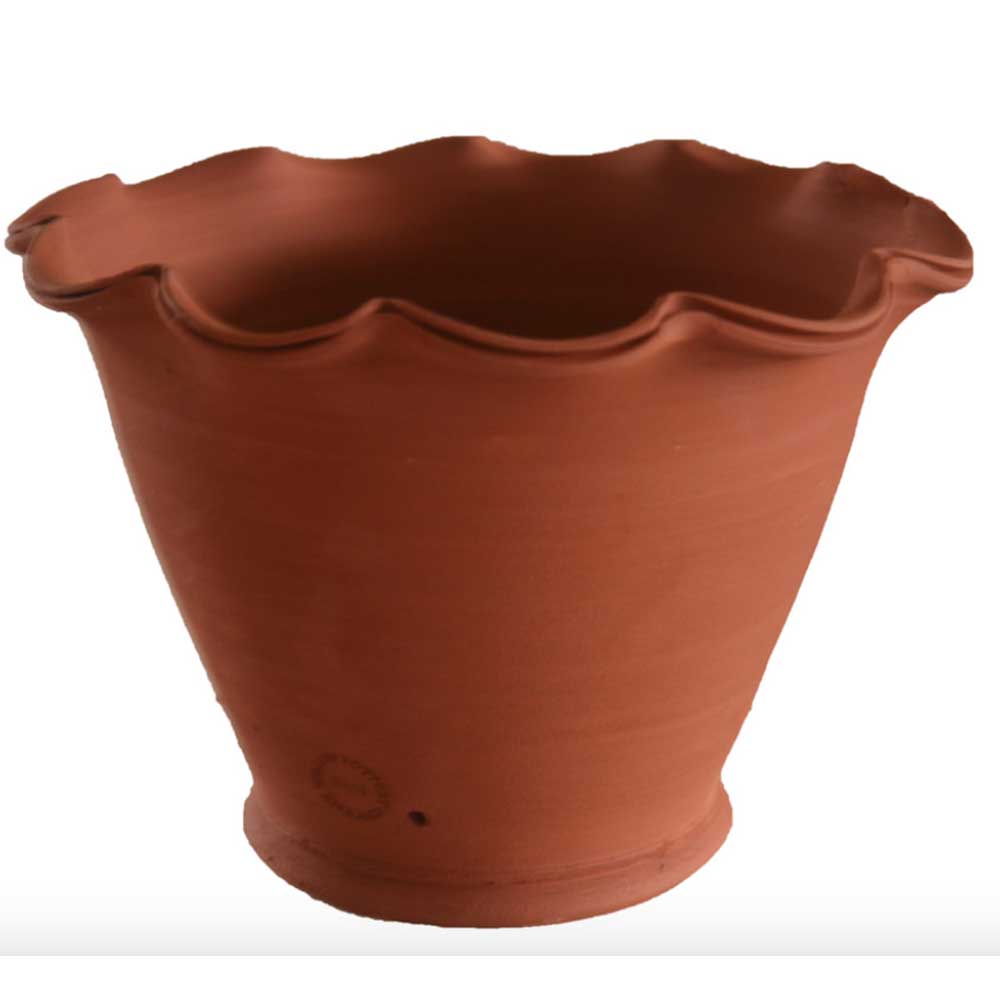
RRP: £18.95 | We adore the pretty detail of the scalloped edging on this terracotta plant pot – it instantly adds a decorative touch to a practical pot.

RRP: £5.99 |Get yourself started with a packet of multi seeds. This packet by seed experts Thompson & Morgan includes Basil, Mint & Chives. The three Packets comprise one of each variety, approximately 1850 seeds in all.
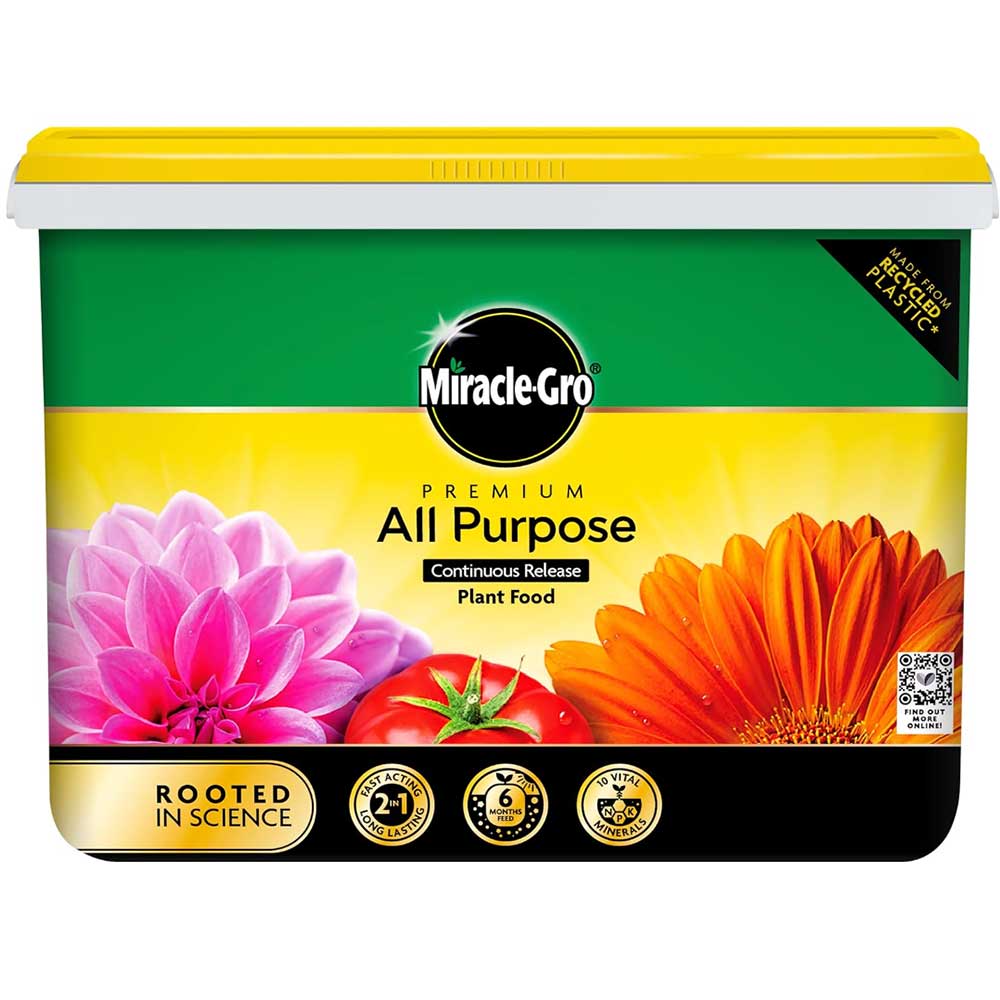
RRP: £15.98 | Choose a plant feed with everything your new herbs need to thrive, like this Premium All Purpose Continuous Release feed that requires just one application every 6 months.
Your step-by-step guide
Now that you have everything you need, you can learn how to grow herbs indoors in earnest – with some gentle guidance from Jekka, of course!
1) Grow from seeds
It might sound more complicated, but Jekka warns that you should "beware of the pot-grown herbs offered in supermarkets, as they are usually grown under glass and are often too lush and stressed to adapt well to life outdoors".
Thankfully, it's surprisingly easy to grow herbs indoors from seeds, there are fewer complications than determining how and when to plant grass seed in spring. All you have to do is (wait for it) read the back of your seed packet for guidance, before placing one seed in each pot or seed tray.
Then, spray or mist the surface of the soil (and only water again if you see the compost drying out), pop them on a warm and sunny windowsill, and wait for them to germinate.
2) Consider the placement
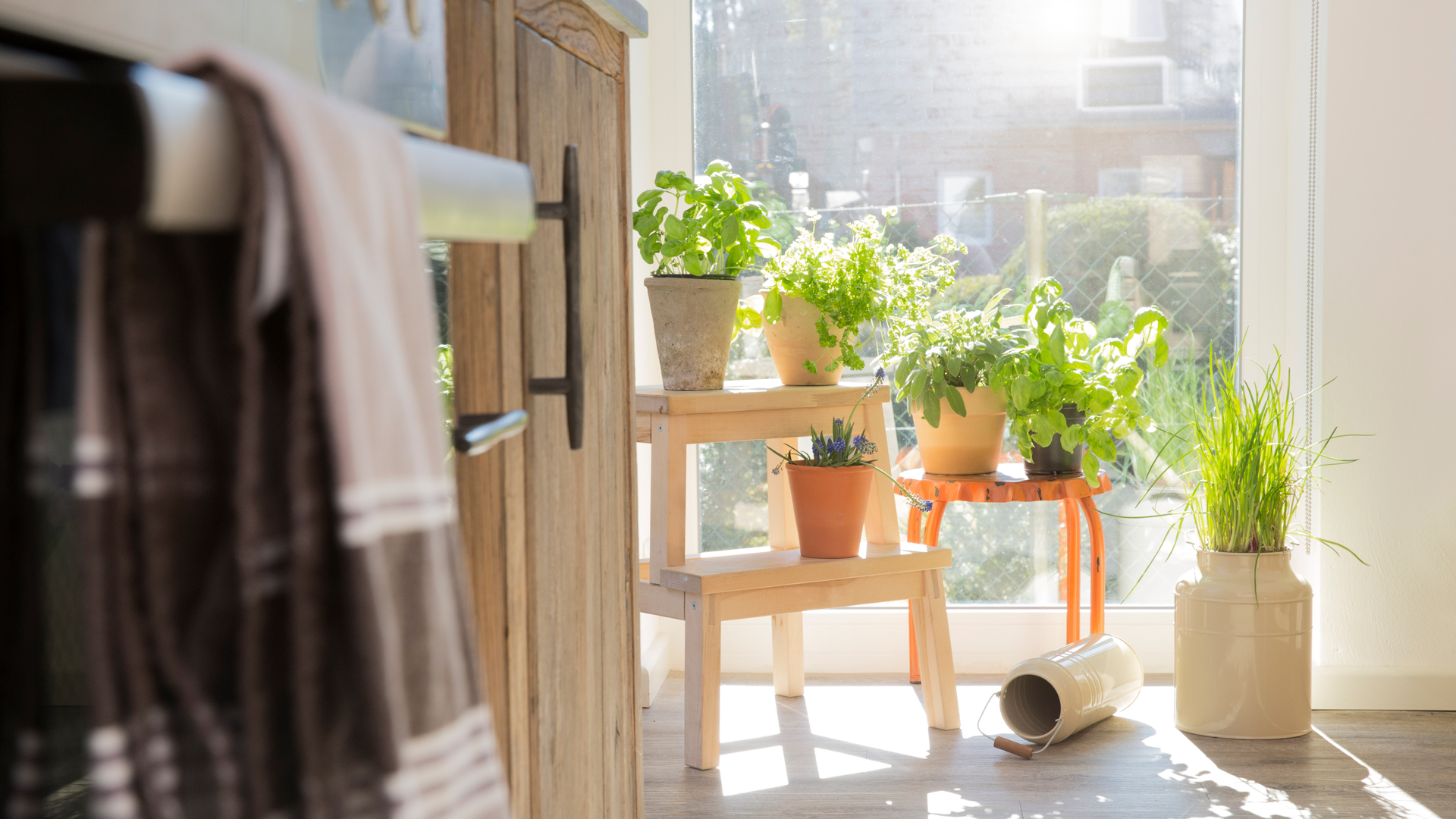
Location, location, location is everything regarding growing herbs indoors. A similar scenario of why your peace lily leaves are turning yellow or your monstera tips are turning brown, it's most likely a problem with the placement.
"Keeping your potted plants healthy often depends on placement," says Jekka. "You should position your container herbs somewhere warm and well-lit until the roots have nicely filled (but not overcrowded) the container."
Lucy agrees, noting that "as a general rule, your herbs will need to be placed in well-drained soil and receive at least six hours of sunlight every day."
If your home's suntraps shift with the seasons, don't worry: Jekka notes that the biggest advantage of growing herbs in containers is that you can move them to sunnier or more sheltered positions depending on the season.
3) Don’t let your plants drown
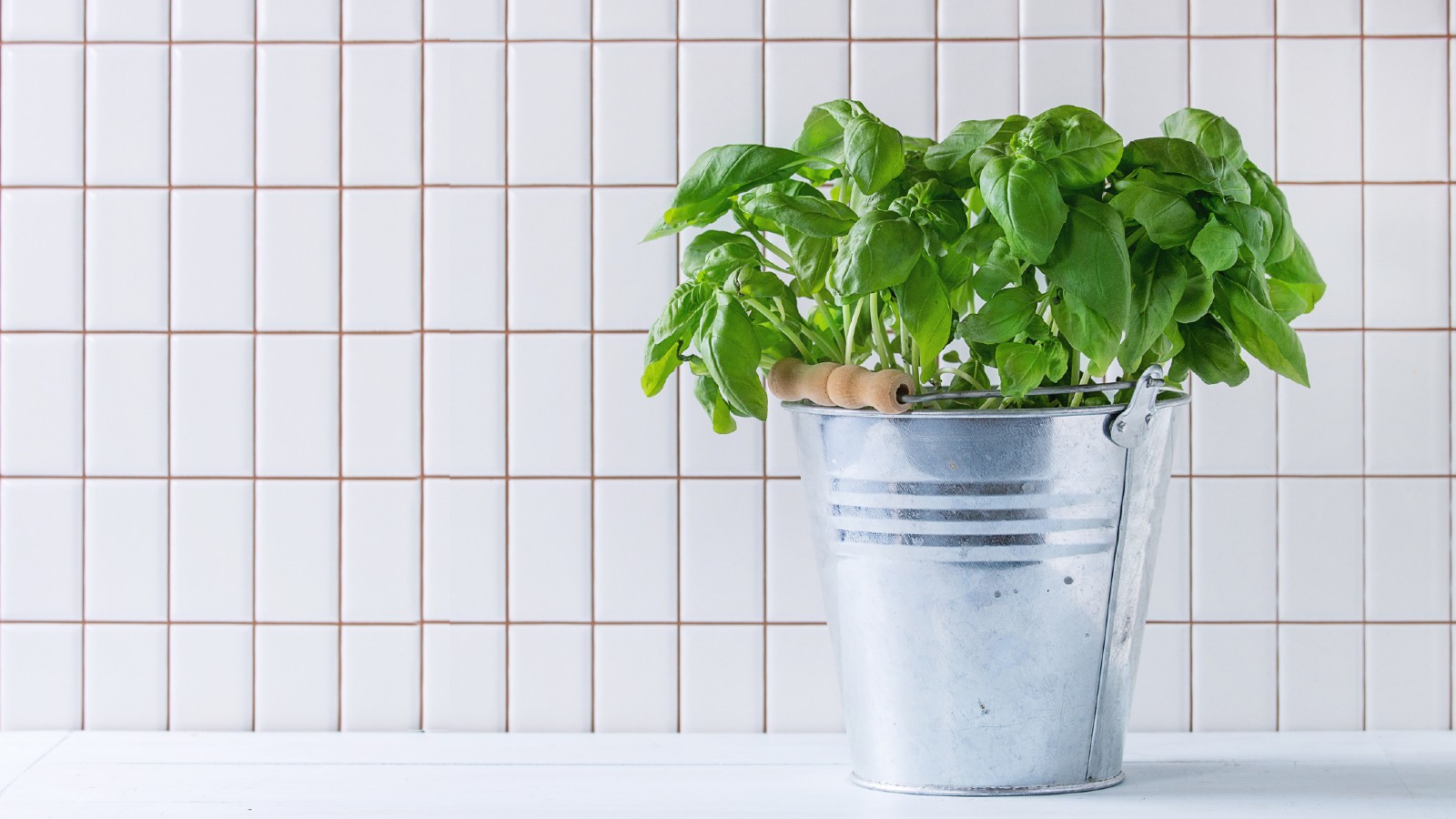
One of the most common houseplant mistakes is misjudging how often you should water houseplants. It is far easier to save an underwatered plant than an overwatered one, and the same will be true of your indoor herb garden.
"Make sure your containers have adequate drainage holes," says Jekka, who advises you "put some broken pot - ‘crocks’ - in the bottom to make sure the draining hole remains open so that the roots don’t become waterlogged."
4) Feed them often
Herbs require routine watering and feeding when grown indoors and in containers because the plants use up all the available nutrients quickly.
"Feed your container-grown herbs regularly with a balanced fertiliser throughout the growing season," says Jekka, noting that she uses a liquid seaweed as this contains all the nutrients herbs need.
"Try something like ‘Feed on Fridays’ so you don't forget," she adds.
5) Pot up slowly
"Pot up a plant one size of pot at a time," advises Jekka.
"Going from a 1 litre pot to a 10 litre pot in one go will stress the plant and can quite often kill it. Therefore, if you have a large decorative pot you wish to use, you should initially sink a smaller pot inside it and pot up until it reaches the size you wish."
6) Trim to maintain
It might sound counterintuitive, but a big part of learning how to grow herbs indoors is cutting them back.
"You should cut back herbs after flowering to maintain their shape and trimming herbs in the spring encourages a crop of new healthy leaves," says Jekka.
"You can harvest perennial herbs like Rosemary, Sage and Thyme almost all year round, but be aware that in late autumn no new growth will occur until spring."
FAQs
Can you grow herbs indoors all year round?
It might feel like an indoor herb garden is a must-try for winter when it's cold and frosty outside, but you can actually grow herbs indoors all year round. Just be sure to keep them warm, in a sunny spot, fed and well watered, and you'll have a very happy array of tasty plants to harvest from.
"You should also ensure your containers have proper drainage and you use high-quality potting mix for your herbs," adds Lucy.
How do you look after herbs indoors?
The good news is looking after herbs indoors is far easier than mastering how to care for an orchid and several other hard houseplants to keep alive. To ensure your herbs thrive indoors, you'll want to sit them by the sunniest window you can.
"That means you need to avoid the corners of your home that are always cast in shadow throughout the day, picking a potential suntrap instead," says Lucy.
Jekka adds that you should water in the morning and never at night. If you notice the leaves are turning yellow or wilting, do not water your herb for a day and see if the plant perks up – you've likely overwatered it.
Finally, be sure to pop them somewhere with good air circulation, especially in the warmer summer months, as this will help prevent disease from spreading.
Now that you know how to grow herbs indoors, the world is your (incredibly well seasoned) oyster: just be sure to only ever harvest what's needed, and to show your new plant babies some TLC.
In no time at all, your flourishing herb garden will be the envy of all...

Kayleigh Dray is an experienced writer and editor within the world of digital journalism. She kicked off her career in magazines with Cosmopolitan as a news writer. Kayleigh then went on to become part of the digital editorial team at Closer, before a successful seven-year stint at Stylist, where she took command as the site’s editor and editor-at-large.
Nowadays, Kayleigh can be found freelancing for a myriad of titles including Woman & Home, along with a role at Ideal Home where she waxes lyrical about her true love: gardening. She is currently giving her own backyard a woodland-inspired makeover – and there have been whispers of a vegetable plot, too.